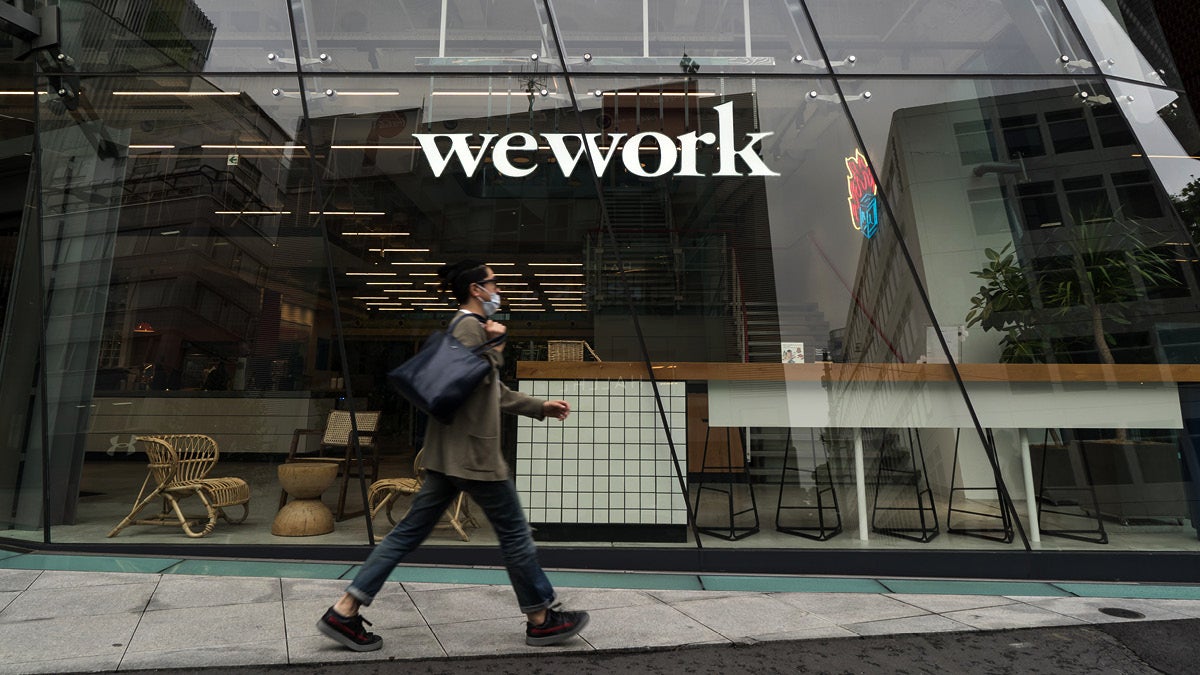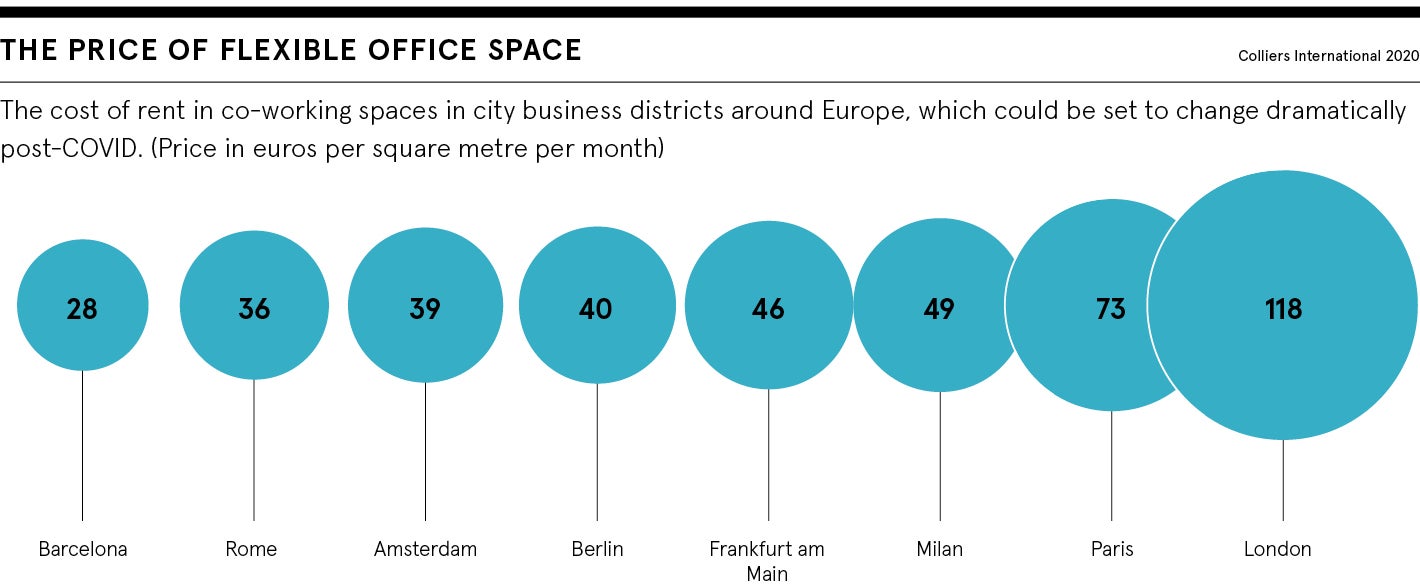
This year, the face of work changed forever. 2020 saw the daily grind get a new look. Gone are office tea rounds and packed tube carriages, replaced with Zoom calls and commuting to your living room.
The challenges facing the co-working industry are clear: with more people working from home than ever before, demand is reduced. And hit by the coronavirus recession, many freelancers can no longer afford the spaces either.
Speaking to chief executives, however, the outlook is largely optimistic. Flexible workspace made up 0.5 per cent of total office space in 2014, grew to 7 per cent by 2020 and was predicted to be 30 per cent by 2030. Co-working is not dead; in fact, it might just be the solution to many businesses’ problems as we emerge from the pandemic.
Coworking spaces: the biggest challenges
Hygiene is a big issue for shared offices. Jitesh Patel, chief executive of office design experts Peldon Rose, explains that businesses now want private space and their own front door. This, of course, is a huge challenge to co-working spaces, whose very premise is built around shared space and socialising.
The biggest benefit of co-working spaces before the pandemic – flexible contracts – has been their biggest downfall during it
Gabriela Hersham, co-founder and chief executive of co-working group Huckletree, which has seven UK sites, says making their venues feel safe is a top priority. They have a cleaning team of “lifesavers”, who are specially trained in hourly COVID-secure cleaning measures.
But a drop in demand is unavoidable. With pay-as-you-go contracts, customers can simply choose to end their membership. Unlike traditional office space, where you might have a five-year lease, you’re not tied into a difficult contract. As Tushar Agarwal, co-founder and chief executive of office-finder platform HubbleHQ, explains: “The biggest benefit of co-working spaces before the pandemic – flexible contracts – has been their biggest downfall during it.”
Coworking operators: do they have the cash to survive?
Vacancy creates a huge cash-flow problem for the spaces, made worse by national lockdowns. Patel predicts 2021 will see increased vacancy, with the added loss of income from day-hire meeting rooms and event spaces, which are no longer in demand. But the biggest loss will come from small and medium-sized enterprises of 20 to 30 people that will, thanks to successful home working, realise they no longer need an office at all.
Others believe the drop in occupancy is overestimated. Huckletree had the strongest year in its history, signing 120 new member businesses during 2020. Hersham attributes this growth to a longing for community; it’s no longer about the need for an office, but about curated communities, with skill-sharing, networking and team-building opportunities.
Shared offices: the future of flexible working?
Flexibility is the key to survival and Agarwal sees the future of co-working as a hybrid-work approach, where companies base their headquarters at a shared space, but have limited capacity. Companies can create a weekly rota of employees who are present at any one time, allowing flexibility and cost-saving, using a “credits” system.
He sees work falling into three “buckets” post-pandemic: a headquarters, home working, and on-demand space, such as with day passes. Not only is this a more cost-efficient way of running your company, but it also enables greater flexibility.
Antonio Wedral, founder of ecommerce specialists Novos, is one chief executive who has adopted this approach. His team has grown by 50 per cent during the pandemic. They have a weekly rota and allocate WeWork workspace credits to 15 staff, who book a desk to go in once a week. Opting for his model over a permanent lease, Wedral says: “This hybrid approach has saved us money on rent and our team love it; they get flexibility and we can continue to grow our culture despite the limitations.”

Post Covid-19: are corporates the ticket to success?
Another trend which may ensure survival is unprecedented interest from corporate occupiers. WeWork is aiming for 70 per cent corporate occupiers by the end of 2021, focusing on attracting corporate clients, rather than freelancers and startups. There’s a shift happening and 76 per cent of Fortune 500 chief executives say they are looking to reduce their office footprint over the next five years.
Huckletree has seen increased interest from corporate occupiers, with companies such as Facebook giving their employees a work-from-home budget, which can be used at co-working spaces. Hersham says it’s about structuring packages on an individual basis to a company’s needs and, as leases come up for renewal, she thinks we’ll see a big shift in corporate occupancies.
She believes employees want to be around innovation and education and the appeal is clear as so much is offered by proxy at a co-working space, with a calendar of events and networking opportunities. As such, co-working spaces can fill a gap for corporate innovation in a cost-effective way.
This may be their hot ticket. With uncertainty created by the pandemic, big corporates are more risk averse than ever. Taking a private office in a co-working space is a less risky solution than a ten-year lease in a traditional office.
Shared offices: a pilot for businesses?
Co-working spaces can also act as a launchpad to test concepts, such as satellite offices outside major cities, where employees have the option of working closer to home. This hub-and-spoke concept has been accelerated by the pandemic, with decentralisation of offices likely to be a common theme in 2021.
Catarina King, who runs Society1 in Preston, has seen a lot of corporate overspill in their shared office space, as more companies move their innovation hub away from London. According to HubbleHQ, 86 per cent of employees want to work somewhere other than the office at least once a week, though only 15 per cent want to do so every day, and perhaps working close to home is the next move.
It seems co-working spaces may have a bright future after all. The office isn’t dead, it’s simply taking a new form that offers businesses of all sizes greater flexibility, choice and lower risk, which might work better for employees everywhere.

This year, the face of work changed forever. 2020 saw the daily grind get a new look. Gone are office tea rounds and packed tube carriages, replaced with Zoom calls and commuting to your living room.
The challenges facing the co-working industry are clear: with more people working from home than ever before, demand is reduced. And hit by the coronavirus recession, many freelancers can no longer afford the spaces either.
Speaking to chief executives, however, the outlook is largely optimistic. Flexible workspace made up 0.5 per cent of total office space in 2014, grew to 7 per cent by 2020 and was predicted to be 30 per cent by 2030. Co-working is not dead; in fact, it might just be the solution to many businesses’ problems as we emerge from the pandemic.





